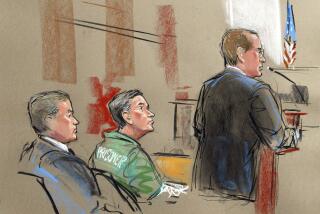Edward Snowden: Hero or criminal?
- Share via
Over the weekend, as Americans were still absorbing double-barreled revelations about the extent of the National Security Agency’s electronic surveillance, the source of that information outed himself. Edward J. Snowden, a 29-year-old former employee of a government contracting firm, acknowledged with no apparent regrets that he was responsible for providing journalists at the Guardian and the Washington Post with evidence of what he called an “architecture of oppression.”
Snowden’s emergence from the shadows puts him at risk of prosecution by the U.S. government. It also has made him a hero to critics of government secrecy. More than 15,000 people already have signed a petition demanding that Snowden be given “a full, free and absolute pardon for any crimes he has committed or may have committed related to blowing the whistle on secret NSA surveillance programs.”
We’re not prepared to endorse that campaign, and we’re not even sure that Snowden qualifies as a whistle-blower in the strict sense of someone who discloses government information in order to expose illegal activity. The two surveillance programs he was apparently responsible for revealing — an electronic dragnet of Americans’ phone records and the monitoring of the contents of foreigners’ electronic communications — are legal, authorized by Congress and overseen (however indulgently) by federal judges.
POLL: Should Edward Snowden go to jail?
Nevertheless, as critics of the breadth and secrecy of post-9/11 surveillance programs, we’re glad that the American people can now appreciate just how extensive those efforts are, and that an informed debate can begin.
For example, it was widely known that the government was using a loosely worded provision of the Patriot Act to acquire so-called business records, including information about the sources, destinations and duration of telephone calls. But it was unclear how indiscriminate that dragnet was. Two years ago, Sen. Ron Wyden (D-Ore.) warned that “the American people will also be extremely surprised when they learn how the Patriot Act is secretly being interpreted.” The next time Congress considers an extension of that law, those who support narrowing its scope need not rely on Wyden’s tantalizing but vague warning.
From the government’s point of view, it’s certainly not ideal if every twentysomething with a security clearance is making his own free-lance decisions about what secrets deserve to be protected and which should be leaked. On the other hand, President Obama himself said of the controversy over the surveillance programs that “I welcome this debate, and I think it’s healthy for our democracy.” Without the leaks that Obama decried (and may prosecute), that debate wouldn’t be taking place.
More to Read
A cure for the common opinion
Get thought-provoking perspectives with our weekly newsletter.
You may occasionally receive promotional content from the Los Angeles Times.









